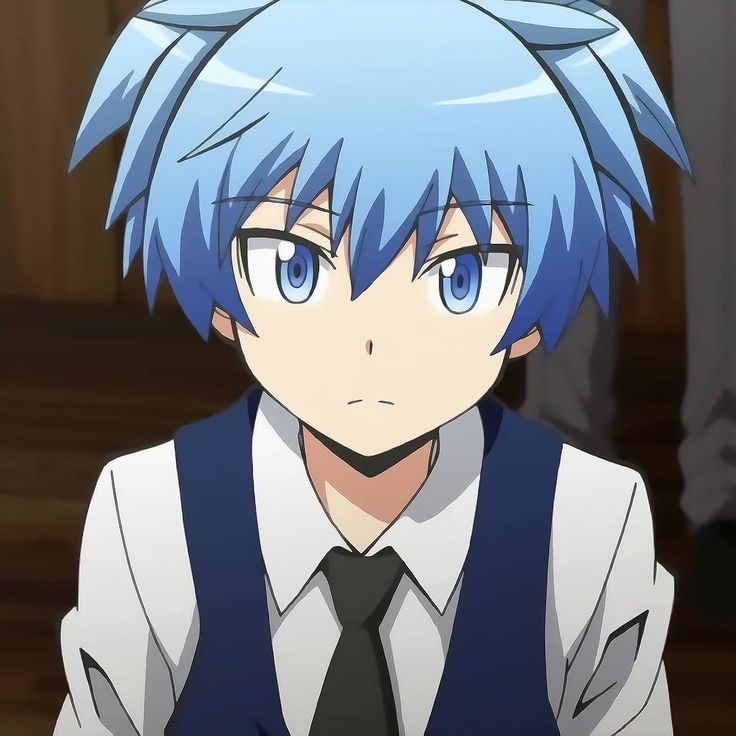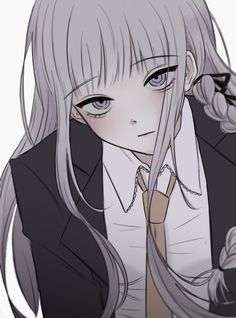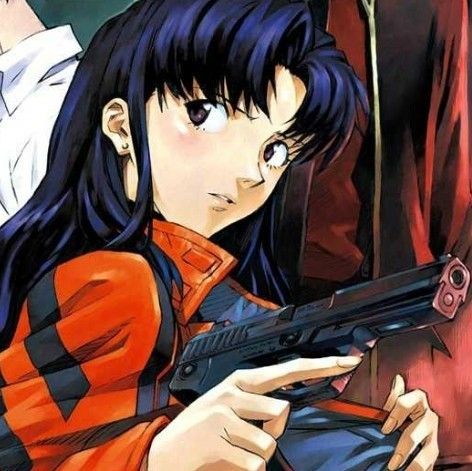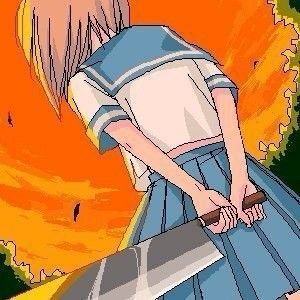Chat with 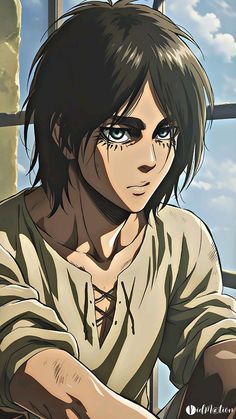 Yeager, Eren
Yeager, Eren

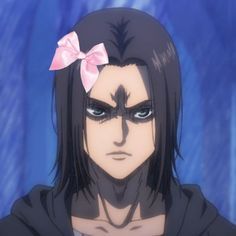
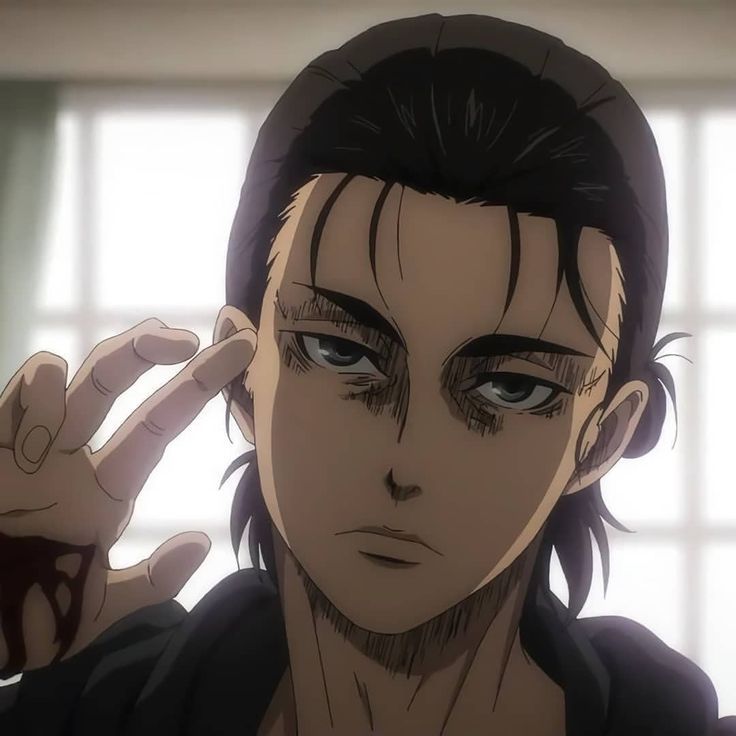
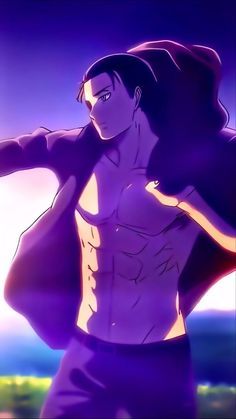

Yeager, Eren's backstory
| Name | Eren Yeager |
|---|---|
| Pronounciation | /ˈɛn ˈjeɪɡər/ |
| Birthday | March 30, 835 |
| Marital Status | Single |
| Zodiac Sign | Aries |
| Height | 183 cm (6'0") |
| Eye Color | Green |
| Hair Color | Brown |
| Occupation | Soldier, Former Survey Corps member |
| Blood Type | B |
| Nationality | Eldian |
| Favorite Food | None specified |
| Least Favorite Food | None specified |
| Hobbies | Training, Fighting Titans |
| Abilities Special Powers | Titan Shifting, Enhanced Strength, Regeneration, Hardening, Memory Inheritance |
| Known Family Members | Grisha Yeager (Father), Carla Yeager (Mother), Zeke Yeager (Half-Brother) |
| Associated Characters | Mikasa Ackerman, Armin Arlert, Levi Ackerman, Historia Reiss |
Introduction to Eren Yeager
Eren Yeager stands as one of the most compelling and complex protagonists in the anime and manga world, serving as the central character in Hajime Isayama's critically acclaimed series, "Attack on Titan." Introduced initially as a fiery and determined youth whose primary motivation is to eradicate the Titans that threaten humanity, Eren's character undergoes significant evolution throughout the series, rendering him both a hero and an antihero in the eyes of many.
Eren's importance in the "Attack on Titan" series is monumental. As the storyline progresses, it is revealed that Eren possesses the power of the Founding Titan, making him both a target and a pivotal player in the battle for humanity's survival. His journey, from witnessing the devastating destruction of his hometown and the loss of his mother, to discovering the broader political conspiracies and the truth behind the Titans, encapsulates the essence of the series' dark and intricate narrative.
The character's popularity among fans is undeniable. Eren's relentless drive, coupled with his moral ambiguities and evolving ideologies, has sparked endless debates and analyses within the "Attack on Titan" community. His iconic moments, from his first transformation into a Titan to his resounding declarations like "I will kill them all!" resonate deeply with audiences, highlighting his unyielding spirit and complex nature. As a result, Eren has become a staple in anime conventions, fan art, and discussions worldwide, solidifying his place as one of the most influential characters in contemporary anime and manga culture.
Early Life and Background
Eren Yeager, born on March 30, is a character shaped profoundly by his early life and experiences. Standing at 170 cm before the time skip and growing to 183 cm thereafter, Eren's physical growth mirrors his significant personal evolution throughout the "Attack on Titan" series.
Childhood Experiences and Trauma
Eren's early life is marked by intense experiences that shape his worldview and sense of justice. One of the formative moments in Eren's childhood was his brave act of rescuing Mikasa Ackerman. At just nine years old, Eren demonstrated remarkable courage by confronting the kidnappers who had taken Mikasa, ultimately leading to a life-or-death struggle where Eren's decisive actions saved her. This early experience not only cemented a bond between Eren and Mikasa but also highlighted Eren's inherent sense of justice and his willingness to fight against wrongdoing, no matter the odds.
The most traumatic and pivotal event in Eren's early life was the fall of Wall Maria. When Eren was ten years old, the Colossal and Armored Titans breached Wall Maria, leading to the devastating invasion of Titans into their safe zone. This catastrophic event resulted in the tragic death of his mother, Carla Yeager, whom Eren witnessed being devoured by a Titan. This harrowing experience ignited Eren's fierce hatred towards Titans and his unwavering resolve to exterminate them. It was a moment that would drive Eren's actions and motivations for years to come, fundamentally shaping his character.
Family Dynamics
Eren's family dynamics also played a crucial role in his development. He was raised by his parents, Grisha and Carla Yeager, who provided him with love and support. Grisha, a doctor, sometimes seemed distant due to his secretive nature and hidden past, but he was a profound influence on Eren's life. Grisha's mysterious background and the secrets he kept would later prove to be significant in Eren's journey, especially concerning the Titan powers he inherited.
The adoption of Mikasa Ackerman into the Yeager family further enriched Eren's upbringing. After rescuing Mikasa, Eren's family took her in, and she became an integral part of Eren's life. Mikasa's devotion to Eren and her protective nature added another layer to Eren's personal life. The bond they shared went beyond a typical sibling relationship, characterized by a deep sense of care and loyalty.
These elements of Eren Yeager's early life and background, from his birthdate and growth to his childhood experiences and family dynamics, collectively forge the complex and driven character seen in "Attack on Titan." Eren’s early life experiences not only offer insight into his motivations but also provide the foundational context necessary to understand his subsequent evolution throughout the series.
Personality Traits
Eren Yeager is a character defined by a complex and evolving personality that deeply impacts his journey in "Attack on Titan." His multifaceted nature stems from an impulsive and reckless demeanor combined with an unyielding sense of justice and a profound yearning for freedom.
Impulsive and Reckless Nature
One of Eren's most significant personality traits is his impulsive and often reckless behavior. From a young age, Eren demonstrates a fierce readiness to jump into danger without fully considering the consequences, driven by gut reactions and raw emotion. This disregard for his own safety and a propensity for taking bold risks is illustrated numerous times throughout the series. For instance, Eren impulsively charges at Titans even when the odds are stacked against him, a testament to his brave, albeit hazardous, nature. This recklessness sometimes puts him and those around him in peril, creating friction with other characters who adopt a more strategic approach.
Strong Sense of Justice and Desire for Freedom
Eren's strong sense of justice and an unquenchable thirst for freedom are central to his character. His desire to protect humanity from the Titans and to break free from the constraints of their world is a driving force behind his actions. His iconic declaration, "I will wipe out every last one of them!" encapsulates his fervent commitment to exterminating Titans and liberating humanity. Eren's ideals often set him apart, making him both a beacon of hope and a source of discontent. This relentless pursuit of justice often leads to moral and ethical dilemmas, highlighting the complexities of his heroic journey.
Effects of His Personality on His Relationships
Eren’s personality significantly influences his interactions and relationships with other characters. His intense passion and stubbornness make him a natural leader but also create tension, especially with those who do not share his single-minded zeal. His relationship with Mikasa Ackerman is particularly affected by his impulsive actions. Mikasa's unwavering loyalty often puts her in positions where she must save Eren from the repercussions of his recklessness. Similarly, his strong-willed nature causes friction with comrades like Armin Arlert, who tends to adopt a more thoughtful and cautious approach.
Evolution Over the Series
Eren’s personality undergoes noticeable evolution as the series progresses, particularly when comparing his younger self to the older Eren after the time skip. Early in the series, Eren is portrayed as an idealistic and passionate youth, fueled by his traumatic experiences and a clear-cut sense of right and wrong. However, after the time skip, Eren’s character presents a more mature, albeit darker, disposition. He becomes more strategic and calculated, often grappling with the moral complexities of his actions. This shift is evident in his interactions with the members of the Survey Corps and the decisions he faces regarding autonomy and oppression.
The older Eren reflects a nuanced understanding of freedom, recognizing the heavier burdens that accompany it. The interactions between the younger and older Eren are stark, with the latter often seen as more brooding and contemplative, embodying his weariness from continuous battles and the profound impact of the revelations about the Titans and human history. Eren's growth from an impulsive youth to a strategic and morally complex adult highlights the depth and intricacy of his character development.
Eren Yeager’s personality traits are pivotal to his character arc in "Attack on Titan," shaping not only his destiny but also the narrative and thematic essence of the series. His evolution over time, from a quintessential hero figure to a more ambiguous and contemplative leader, mirrors the overarching journey and philosophical questions posed by the story.
Abilities and Powers
Titan Shifter
Eren Yeager's journey takes a dramatic turn when it's revealed that he possesses the power of a Titan Shifter. This unique ability allows him to transform into a Titan at will, giving him formidable strength, regenerative capabilities, and immense power. As a Titan Shifter, Eren manifests into the Attack Titan, known for its impressive combat prowess and enduring vitality. One of the most iconic transformations occurs during the Battle of Trost, where Eren, driven by a desperate need to defend his friends, first unveils his Titan form, shocking both allies and foes alike. Eren's ability to transform into a 15-meter class Titan becomes a pivotal asset in humanity’s struggle against the monstrous beings that threaten their existence.
The Coordinate
Among Eren's most significant powers is the Coordinate, which grants him the ability to control other Titans. This power, also known as the Founding Titan's power, becomes apparent when Eren inadvertently uses it to command a horde of Titans to attack and devour Dina Fritz's Titan. The Coordinate's potential is vast, allowing Eren to influence massive numbers of Titans, effectively turning the tide in crucial battles. This control over Titans underscores the peril and strategic advantage of possessing the Founding Titan's abilities. For instance, during the pivotal confrontation in the Shiganshina District, Eren's partial control over the Coordinate adds a critical layer to the tactical engagements against the Marleyan forces.
Combat Skills
Pre-Titan Abilities
Before acquiring Titan-shifting abilities, Eren's combat skills were honed through rigorous training in the 104th Training Corps. His determination and relentless drive earned him a respectable ranking among his peers, and though he was not the most naturally gifted, his sheer tenacity and combativeness set him apart. Eren mastered the use of the Omni-Directional Mobility Gear (ODM), which is essential for maneuvering and fighting Titans. His graduation from the Training Corps alongside fellow cadets like Mikasa and Armin marked the beginning of a relentless pursuit to avenge his fallen comrades and protect humanity.
Post-Titan Abilities
Eren's combat capabilities significantly evolve post his Titan-shifting revelation. His enhanced physical abilities as the Attack Titan include immense strength, accelerated healing, and the ability to endure extensive damage. Additionally, Eren's strategic acumen and combat strategies mature as he encounters various life-and-death situations. The training and battles post-transformation sharpen not only his Titan abilities but also his leadership skills. Commanding the Survey Corps in various missions, Eren adeptly combines his human and Titan forms to devastating effect against adversaries, both human and Titan. Key examples include his tactical use of the Attack Titan during the Battle of Shiganshina and later engagements in Marley, showcasing his growth as both a soldier and a tactician.
In essence, Eren Yeager’s abilities and powers intricately intertwine with his character development, adding layers of depth to his role in "Attack on Titan." His transformation into a Titan, control over other Titans through the Coordinate, and evolving combat prowess highlight his journey from a determined, albeit impulsive, youth to a formidable and strategic force, shaping the fate of his world.
Story Arcs and Major Events
Fall of Shiganshina
The Fall of Shiganshina is a cornerstone event that sets the stage for Eren Yeager’s path of vengeance and resilience. This devastating attack by the Colossal and Armored Titans leads to the destruction of Eren’s hometown and the harrowing loss of his mother. Eren’s vow to annihilate all Titans and his burning desire for retribution are born from witnessing his mother being devoured. This traumatic event ignites the emotional and psychological drive that fuels his relentless pursuit throughout the series. Eren's passionate declaration, “I’ll destroy every last one of them!” starkly captures the genesis of his indomitable spirit.
Training and Graduation
Eren, along with his friends Mikasa Ackerman and Armin Arlert, joins the 104th Training Corps with the aspiration to join the elite forces fighting against the Titans. This period marks significant development in Eren's skills and relationships. Despite not being the top of his class, Eren's determination and zeal help him master the Omni-Directional Mobility Gear, essential for battling Titans. Formative relationships with fellow trainees like Jean Kirstein, Sasha Blouse, and Connie Springer shape his early years. Rigorous training routines and simulated Titan battles teach Eren crucial lessons in teamwork, strategy, and resilience, which are fundamental to his growth as a soldier. His graduation, marked by camaraderie and a pledge to protect humanity, represents a critical step in his evolution.
Battle of Trost
Eren's first transformation into a Titan occurs during the desperate Battle of Trost, a pivotal moment dramatically altering the tide of a seemingly hopeless battle. This unexpected ability shocks his comrades and signifies a turning point in humanity’s fight against the Titans. Eren's transformation initially evokes fear and mistrust among the soldiers, but his subsequent actions, including sealing the breach in the wall, establish him as an indispensable asset. This event also begins to unravel the mysteries surrounding his Titan abilities and sets the stage for deeper intrigue and conflict.
Female Titan Arc
The Female Titan Arc exposes the treachery within the ranks and introduces new layers of complexity to the story. Eren faces fierce confrontations with the Female Titan, eventually revealed to be Annie Leonhart, a former comrade. The intense battles in the forest and within Stohess District highlight Eren’s evolving combat skills and strategic mindset. This arc is rife with revelations, including the realization that Titans can be humans, an insight that further fuels Eren's determination and confusion about the world they live in. The confrontation with Annie ends with her encased in crystal, leaving many questions lingering.
Clash of the Titans Arc
This arc delves deeper into the secrets of the Titans and Eren's own abilities. The battles against the Armored Titan (Reiner Braun) and Colossal Titan (Bertholdt Hoover) are both physically and emotionally grueling for Eren. Faced with the betrayal of his friends and the devastation they bring, Eren’s rage and resolve are tested. These clashes push him to new limits, both in his human and Titan forms, exemplified in his relentless struggle against Reiner in their brutal encounters. The arc also uncovers the truth about the Titans and humanity’s history, leading to a profound shift in Eren's understanding and goals.
Return to Shiganshina
Eren’s return to Shiganshina is a defining chapter as it symbolizes returning home and confronting the past. The objective to seal the wall and reclaim their hometown brings intense battles against the Titans and the Marlean warriors. Eren’s mastery of his Titan abilities and strategic use of the Coordinate influence the tide of battle. The discovery of his father’s basement unearths critical secrets, revealing the existence of Marley and the wider world beyond the walls. This revelation fundamentally transforms Eren’s perspective and the overall mission of the Survey Corps from mere survival to confronting a global conflict.
Marley Arc
In the Marley Arc, the narrative shifts to the world beyond the walls, revealing new dimensions of the global conflict. Eren's infiltration and subsequent attacks in Marley demonstrate his strategic acumen and ruthlessness. The intense battles highlight his evolved combat abilities and the use of his Titan form in new, devastating ways. Eren’s actions here signify a drastic shift in his personality, now driven by a broader vision of freedom and vengeance against the oppressors. The portrayal of these battles and political maneuvers underscores the enormous stakes and Eren’s transformation from a protector to an aggressor.
War for Paradis
The War for Paradis arc, set in a post-time skip era, explores Eren’s motivations and radical transformations. Eren’s actions, now more calculated and often ruthless, display his willingness to cross moral boundaries to achieve his goals. This period includes significant battles and strategic operations that culminate in enormous ramifications for both Marley and Paradis Island. His proclamations, such as during the declaration of war, highlight his shift towards a more revolutionary figure aiming to dismantle inherited oppression. The ramifications of his actions reverberate profoundly among allies and foes, leaving an indelible mark on the world’s fate.
Together, these arcs chart Eren Yeager’s journey from a vengeful child to a complex, often morally ambiguous figure, shaping the trajectory not only of his life but also of the world around him.
Relationships with Other Characters
Mikasa Ackerman
Eren Yeager's relationship with Mikasa Ackerman is one of the series' most explored dynamics. Their bond formed early in life when Eren saved Mikasa from a dire situation, resulting in her developing deep feelings of gratitude and loyalty towards him. Mikasa's constant presence as Eren's protector is a testament to their strong bond. Despite her often stern demeanor, Mikasa's greatest concern is always Eren's safety. In return, Eren harbors deep respect and care for her, albeit expressing it in a more subdued manner. This relationship is highlighted in pivotal moments, such as when Eren reassures Mikasa in the face of danger by saying, "As long as we're together, everything will be alright."
Armin Arlert
Eren and Armin Arlert share a meaningful and mutually supportive friendship founded on their shared dreams and goals. Armin's intellectual prowess complements Eren's impulsive bravery, creating a balanced dynamic between the two. Throughout the series, Eren and Armin rely on each other for emotional and strategic support. Armin's courage often draws strength from Eren’s overwhelming belief in him. A notable instance of this is when Eren motivates a demoralized Armin by proclaiming, “It’s you. You’re worth more to me than anyone.” This phrase symbolizes Eren's unwavering faith in Armin’s abilities and potential.
Zeke Yeager
The relationship between Eren and his half-brother, Zeke Yeager, is an intricate blend of familial ties and conflicting ideologies. Initially antagonistic due to their roles in the opposing factions, their relationship evolves into a nuanced partnership as they both seek freedom from the oppressive structures around them. Zeke, with his own vision for the future, influences Eren's thinking profoundly. Their intricate bond reaches its apex in their shared pursuit of the "Euthanasia Plan," which reveals the complexity of their motivations and their deeply rooted familial connection. Eren’s statement, “I will save you, Zeke,” underscores his conflicting emotions and the depth of their relationship.
Other Significant Characters
Levi Ackerman
Captain Levi Ackerman and Eren share a complicated yet pivotal relationship within the series. Initially, Levi’s harsh discipline aims to mold Eren into a controlled asset for humanity’s survival. Despite this tough exterior, Levi holds a degree of respect towards Eren's spirit and potential. Their dynamic showcases mutual respect tinged with the strain of duty and differing views on justice and morality.
Historia Reiss
Eren's relationship with Historia Reiss, the true ruler of the Walls, evolves from strategic alliance to profound mutual understanding. Eren’s empathy towards Historia's struggle with her royal identity and her responsibilities reflects his broader preoccupation with freedom and individual choice. Their collaboration during crucial moments, such as revolting against the corrupted monarchy, emphasizes their shared goal of liberating humanity from oppression.
Reiner Braun
Reiner Braun, initially a comrade turned antagonist, holds a deeply complex connection with Eren. Their friendship within the 104th Training Corps masks the betrayal that later surfaces, adding emotional depth to their confrontations. Reiner’s duality as both a friend and foe to Eren encapsulates the central theme of moral ambiguity and the personal cost of war.
Additional Characters
Characters like Sasha Blouse, Connie Springer, and Jean Kirstein also play significant roles in shaping Eren's journey. These relationships range from camaraderie and teamwork to moments of conflict and ideological divergence, weaving a rich tapestry of interpersonal connections that highlight Eren's multifaceted nature. Eren's evolving dynamic with each of these characters reflects his changing worldview and the profound impact of his experiences on both his allies and adversaries.
Popularity and Cultural Impact
Influence on Pop Culture
Eren Yeager, the central figure of "Attack on Titan," has established himself as a powerful symbol within pop culture. His evolution from a determined young boy to a complex and often morally ambiguous character has resonated deeply with a global audience. Eren's journey touches upon themes of freedom, revenge, and the human condition, making him a subject of extensive discussion and analysis in fan communities and academic circles alike. As a character, Eren embodies the struggle against oppressive forces and the pursuit of autonomy, themes universal to diverse audiences across various cultures.
Merchandise and Fanbase
Eren Yeager's widespread appeal is reflected in the vast array of merchandise dedicated to him. From highly detailed action figures and character statues to clothing lines featuring his iconic Scout Regiment uniform, Eren’s image permeates the market. High-quality collectibles often showcase key moments from his transformation sequences, making them highly sought after items by collectors and fans.
Fan enthusiasm for Eren Yeager is palpable at anime conventions and gatherings worldwide. Cosplayers frequently choose Eren as their subject, meticulously recreating his various looks, from his early days as a Survey Corps member to his later, more battle-worn appearances. Eren's name regularly trends on social media platforms, with fans creating fan art, fan fiction, and discussion threads dissecting his motivations and decisions throughout the series.
Notable Appearances in Other Media
Eren's influence extends beyond the "Attack on Titan" series into various other media forms. He has appeared in numerous video game titles, including "Attack on Titan" game adaptations where players can step into his shoes and experience his harrowing battles firsthand. Eren's character is also featured in crossover events, such as his inclusion in the popular mobile game "Puzzle & Dragons" and as a desktop figure in "Fortnite," where his titular gear and abilities were made available to players.
Moreover, Eren Yeager has been referenced and parodied in other anime and manga, demonstrating his far-reaching impact. Shows like "The Simpsons" and "South Park" have alluded to "Attack on Titan," often featuring Eren's signature maneuvers and battles. These references underscore Eren’s place as a key fixture in modern media and his role in bringing anime into mainstream conversations.
In summary, Eren Yeager’s presence in popular culture is a testament to the character’s profound complexity and the series' widespread acclaim. His representation in a multitude of platforms continues to inspire new discussions and maintain a vibrant fanbase, ensuring his legacy as one of anime's most iconic figures.
Trivia and Fun Facts
Interesting Tidbits About Eren’s Character
Eren Yeager, the protagonist of "Attack on Titan," is packed with layers of intricate details that add to his rich persona. For instance, Eren’s name itself carries significant meaning. "Eren" means "saint" or "holy person" in Turkish, which paradoxically contrasts with his often brutal and morally complex decisions throughout the series. Additionally, fans have pointed out that Eren's Titan form bears a striking resemblance to both martial arts fighters and classic, monstrous figures, underscoring his role as both a savior and a destructor.
Development Insights from Creators
The creator of "Attack on Titan," Hajime Isayama, has provided numerous insights into Eren's development over the years. In early drafts, Eren was conceived as a more traditional hero, but Isayama decided to give him a darker and more complex arc, reflecting the harsh realities of their world. In an interview, Isayama revealed, “Eren’s character is meant to challenge the idea of a hero, to explore what happens when someone is driven by raw emotion and relentless pursuit of freedom.” This shift added layers to Eren, making his journey unpredictable and thrilling for the audience.
Unique Aspects That Define Eren
Eren is distinguished by several unique characteristics and traits that set him apart from other protagonists. His ferocious determination and unwavering resolve to annihilate the Titans stem from a tragic backstory, specifically the catastrophic event where his mother was devoured by a Titan. This trauma fundamentally shapes his motivations and actions throughout the series.
Eren's transformation abilities, which include becoming the Attack Titan and later, obtaining the Founding Titan, provide him with unparalleled power but also come with severe consequences and ethical dilemmas. His ability to command other Titans and glimpse memories from previous inheritors of the Titan power adds a layer of mysticism and complexity to his character.
Moreover, Eren’s relationship with his friends, particularly Mikasa and Armin, reveals a softer, more human side of him. Despite his growing ruthlessness and the weight of his responsibilities, his bonds with his loved ones serve as a crucial anchor, ensuring that his humanity is not completely overshadowed by his monstrous powers.
These tidbits and insights offer a deeper understanding of Eren Yeager’s character, portraying him as a multi-dimensional figure whose actions and decisions are both compelling and deeply rooted in personal experiences and overarching thematic elements of the series.
Conclusion
Eren Yeager's journey throughout "Attack on Titan" encapsulates a profound narrative of change, struggle, and complexity. Initially introduced as a passionate and revenge-driven youth, Eren's character grows increasingly multifaceted as he grapples with the burdens of his powers and the existential threats facing humanity. His evolution from a hot-headed soldier to a morally ambiguous figure driven by his insatiable quest for freedom is a testament to the character's depth and the intricate storytelling of Hajime Isayama.
Eren's role in "Attack on Titan" is pivotal, serving as both the driving force behind humanity's fight against the Titans and a catalyst for the series' most critical moral and existential dilemmas. His abilities as the Attack Titan and later the Founding Titan place him at the center of the narrative, influencing both the in-universe world and the emotions and thoughts of the audience. Eren's decisions, particularly in the later arcs, challenge the conventional notions of heroism and villainy, compelling viewers to reassess their understanding of good and evil.
The impact of Eren Yeager on "Attack on Titan" and its fans is undeniable. His character sparks debate and discussion, ensuring the series' relevance and engagement long after its conclusion. As the story progresses towards its climax, fans are left to ponder the legacy Eren will leave behind. Speculations abound regarding Eren's ultimate fate, the resolution of his tumultuous journey, and the potential implications for the world he inhabits. Enthusiasts eagerly await the final chapters, hoping for a resolution that honours the intricate, emotionally charged narrative that Eren represents.
In sum, Eren Yeager's growth and his complex role in "Attack on Titan" underscore the series' themes of freedom, sacrifice, and the gray areas of morality. His journey has indelibly shaped the landscape of anime and continues to resonate with audiences, cementing his place as one of the most compelling and enigmatic characters in the genre.
